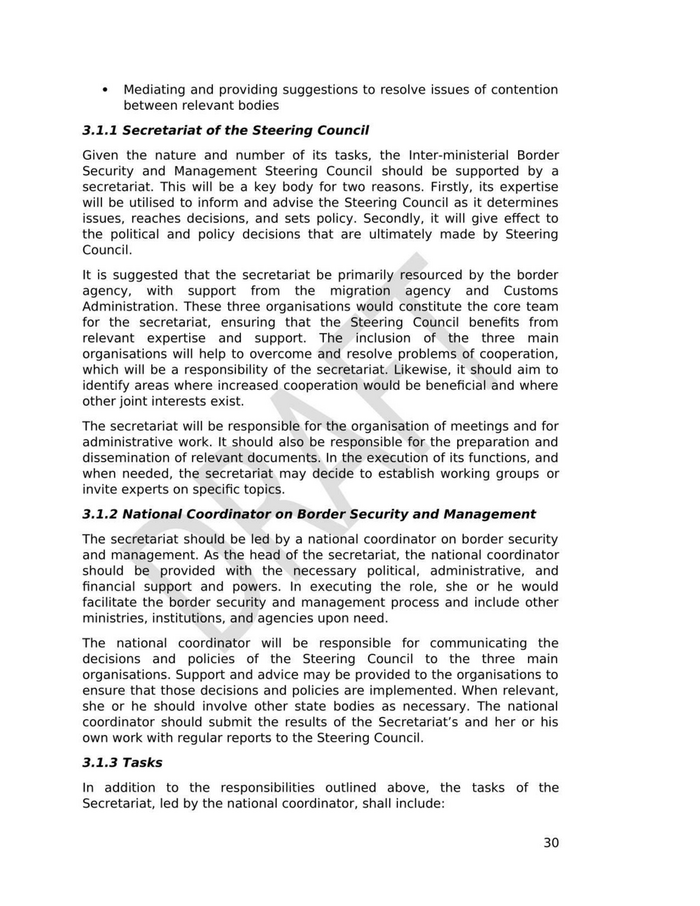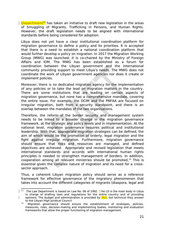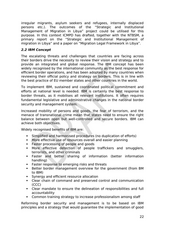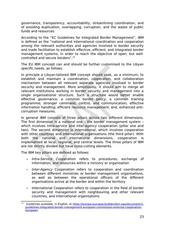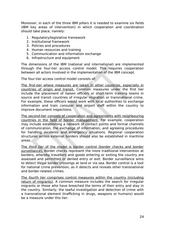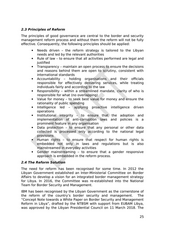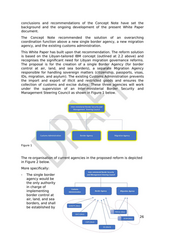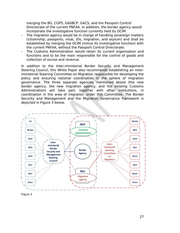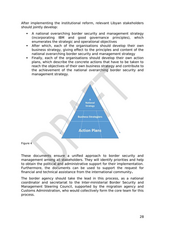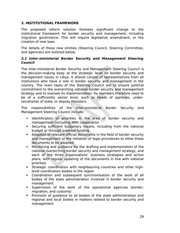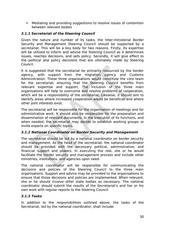White_Paper_Dec_2019
| Department? has taken an initiative to draft new legislation in the areas of Smuggling of Migrants, Trafficking in Persons, and Human Rights. However, the draft legislation needs to be aligned with international standards before being considered for adoption. Libya does not yet have a clear institutional coordination platform for migration governance to define a policy and its priorities. It is accepted that there is a need to establish a national coordination platform that would further develop a policy on migration. In 2017 the Migration Working Group (MWG) was launched; it is co-chaired by the Ministry of Foreign Affairs and IOM. The MWG has been established as a forum for coordination between the Libyan government and the international community providing support to meet Libya’s needs. The MWG does not coordinate the work of Libyan government agencies nor does it create or implement policies. Moreover, there is no dedicated migration agency for the implementation of any policies or to take the lead on migration matters in the country. There are some institutions that are leading on certain aspects of migration governance, but none has a comprehensive mandate, covering the entire issue. For example, the DCIM and the PNFAA are focused on irregular migration, both from a security standpoint, and there is an overlap between the mandates of the two organisations. Therefore, the reform of the border security and management system needs to be linked to a broader change in the migration governance framework, at the strategic and policy levels and in implementation. At the national level, migration governance requires political and institutional leadership. With that, appropriate migration strategies can be defined, the aim of which would be the promotion of orderly, legal migration and the fight against irregular migration. Furthermore, migration governance should ensure that risks and resources are managed, and defined objectives are achieved. Appropriate and revised legislation that meets international standards and accords with international human rights principles is needed to strengthen management of borders. In addition, cooperation among all relevant ministries should be promoted.'* This is essential given the complex nature of migration and its need for a cross- sector approach. Thus, a coherent Libyan migration policy should serve as a reference framework for effective governance of the migratory phenomenon that takes into account the different categories of migrants (diaspora, legal and "3 The Law Department is based on Law No. 06 of 1992. Tthe LD is the main body in Libya in charge of drafting laws and regulations for the entire country and of providing | opinions. The budget and administration is provided by Mol, but technical they answer to the Libyan High Juridical Council. Migration governance should ensure the establishment of strategies, policies, measures, rules, decision-making and implementing bodies, monitoring and evaluation frameworks that allow the proper functioning of migration management. 21
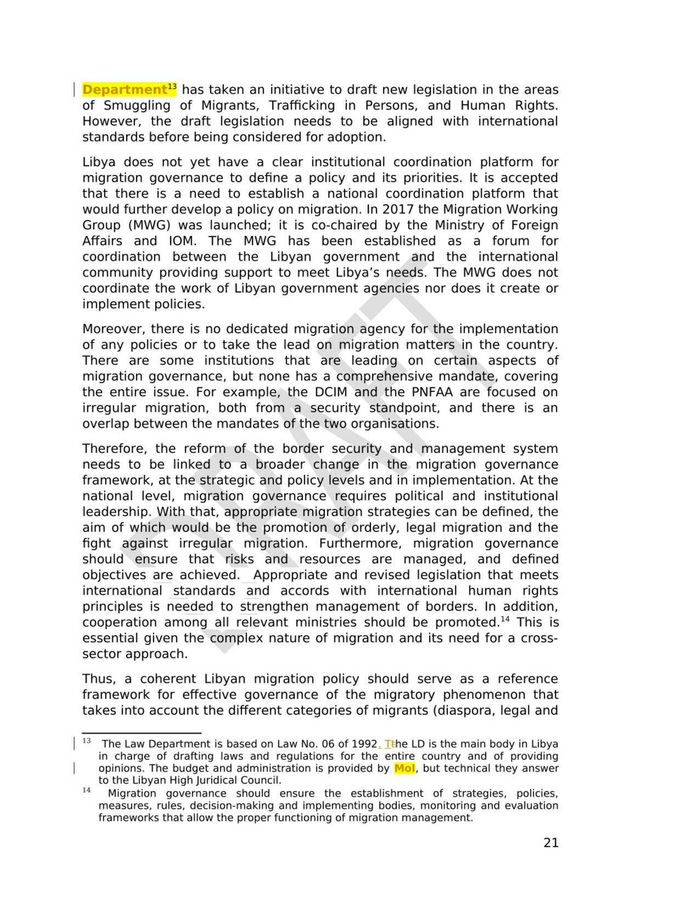
irregular migrants, asylum seekers and refugees, internally displaced persons etc.).. The outcomes of the “Strategic and Institutional Management of Migration in Libya” project could be utilised for this purpose. In this context ICMPD has drafted, together with the NTBSM, a primary report on the “Strategic and Institutional Management of migration in Libya” and a paper on “Migration Legal Framework in Libya”. 2.2 IBM Concept The escalating threats and challenges that countries are facing across their borders drive the necessity to review their vision and strategy and to provide an integrated and global response. The IBM concept has been widely recognised by the international community as the best response for efficient border operations, and has been adopted by many countries when reviewing their official policy and strategy on borders. This is in line with the best practice of EU member states and other countries in the world. To implement IBM, sustained and coordinated political commitment and efforts at national level is needed. IBM is certainly the best response to border threats, as it mobilises all relevant institutions. It often requires fundamental legislative and administrative changes in the national border security and management system. Increased mobility of persons and goods, the fear of terrorism, and the menace of transnational crime mean that states need to ensure the right balance between open but well-controlled and secure borders. IBM can achieve both objectives. Widely recognised benefits of IBM are: Simplified and harmonised procedures (no duplication of efforts) More effective use of resources overall and easier planning Faster processing of people and goods More effective detection of people traffickers and smugglers, terrorists, and other criminals « Faster and better sharing of information (better information handling) « Faster response to emerging risks and threats «e Better border management overview for the government (from BM to IBM) «e Synergy and efficient resource allocation « Clear chain of command and preserved control and communication (CCC) «®e Clear mandate to ensure the delineation of responsibilities and full accountability «e Common training strategy to increase professionalism among staff Reforming border security and management is to be based on IBM principles and a strategy that would guarantee the implementation of good 22
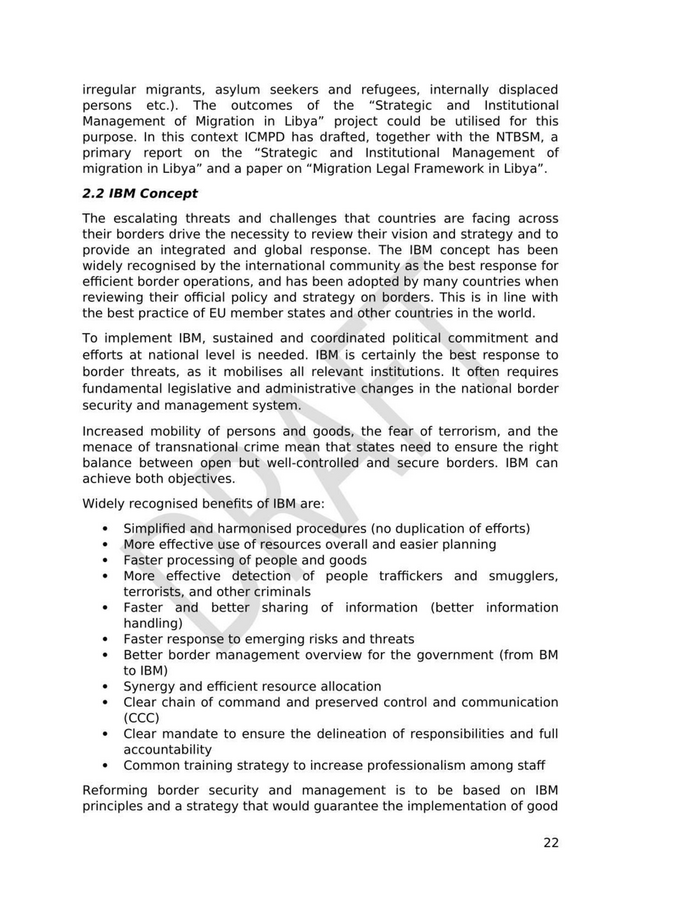
governance, transparency, accountability, streamlining coordination, and of avoiding duplication, overlapping, corruption, and the waste of public funds and resources. According to the “EC Guidelines for Integrated Border Management”, IBM is defined as the “national and international coordination and cooperation among the relevant authorities and agencies involved in border security and trade facilitation to establish effective, efficient, and integrated border management systems, in order to reach the objective of open, but well- controlled and secure borders”.'? The EU IBM concept can and should be further customised to the Libyan specific needs, as follows. In principle a Libyan-tailored IBM concept should seek, as a minimum, to establish and maintain a coordination, cooperation, and collaboration mechanism between all relevant separate agencies involved in border security and management. More ambitiously, it should aim to merge all relevant institutions working in border security and management into a single organisational structure. Such a structure would better enable effective governance; a common border policy; a common training programme; stronger command, control, and communication; effective information handling; efficient resource management; and, enhanced anti- corruption measures. In general IBM consists of three pillars across two different dimensions. The first dimension is a national one - the border management system - which involves intra-service and inter-agency cooperation (pillar one and two). The second dimension is international, which involves cooperation with other countries and international organisations (the third pillar). With both the national and international dimensions, cooperation is implemented at local, regional, and central levels. The three pillars of IBM are not strictly divided but have cross-cutting elements. The IBM key pillars are defined as follows: - Intra-Service Cooperation refers to procedures, exchange of information, and resources within a ministry or organisation - Inter-Agency Cooperation refers to cooperation and coordination between different ministries or border management organisations, as well as between the operational officers of the different organisations active at the border and within the territory - International Cooperation refers to cooperation in the field of border security and management with neighbouring and other relevant countries, and international organisations 15 Guidelines available, in English, at https://europa.eu/capacity4dev/ibm-eap/document/l- qguidelines-integrated-border-management-european-commission-external-cooperation- european 23
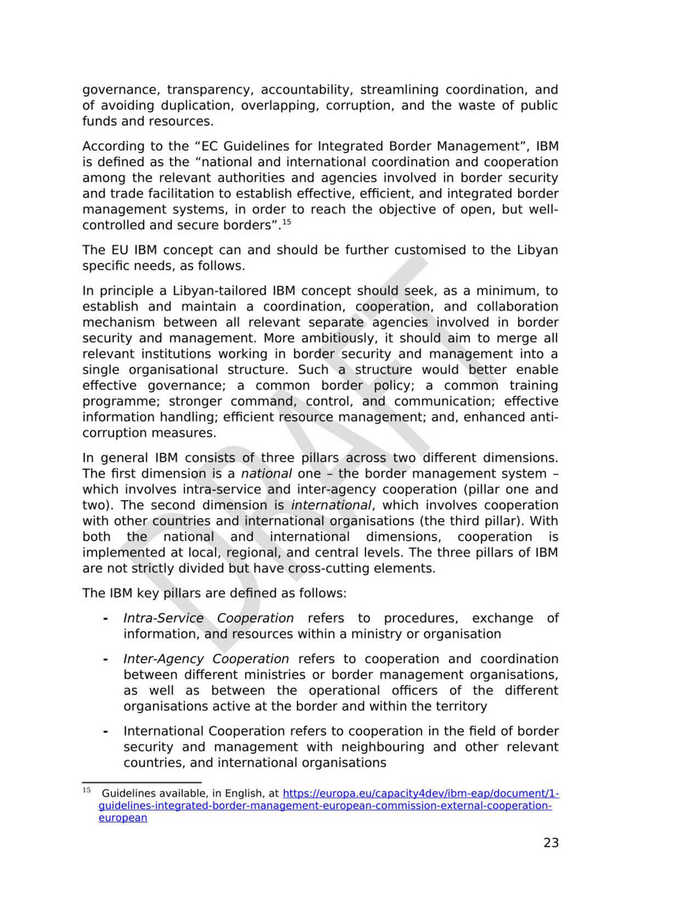
Moreover, in each of the three IBM pillars it is needed to examine six fields (IBM key areas of intervention) in which cooperation and coordination should take place, namely: 1. Regulatory/legislative framework Institutional framework Policies and procedures Human resources and training Communication and information exchange Infrastructure and equipment UBRWMN The dimensions of the IBM (national and international) are implemented through the four-tier access control model. This requires cooperation between all actors involved in the implementation of the IBM concept. The four-tier access control model consists of: The first-tier where measures are taken in other countries, especially in countries _of_origin and transit. Common measures under the first tier include the placement of liaison officers or short-term training teams in source and transit countries of irregular migration or transnational crime. For example, these officers would work with local authorities to exchange information and train consular and airport staff within the country to improve document inspections. The second-tier consists of cooperation and agreements with neighbouring countries in the field of border management. For example, cooperation may include establishing a network of contact points and formal channels of communication, the exchange of information, and agreeing procedures for handling incidents and emergency situations. Regional cooperation structures across external borders should also be established in maritime areas. The _third tier of the model is border control (border checks and border surveillance). Border checks represent the more traditional intervention at borders, whereby travellers and goods entering or exiting the country are assessed and permitted or denied entry or exit. Border surveillance aims to detect illegal border crossings at land or via sea. Border control is a tool for national crime prevention, as it detects and reveals other transnational and border-related crimes. The fourth tier comprises control measures within the country (including return of migrants). A common measure includes the search for irregular migrants or those who have breached the terms of their entry and stay in the country. Similarly, the lawful investigation and detection of crime with a transnational element (trafficking in drugs, weapons or humans) would be a measure under this tier. 24
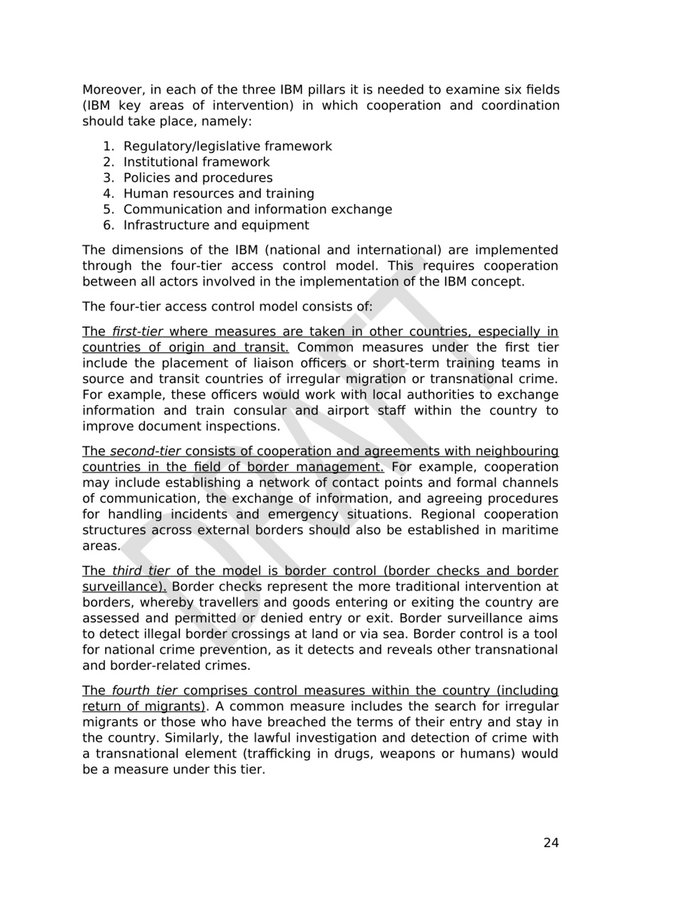
2.3 Principles of Reform The principles of good governance are central to the border and security management reform process and without them the reform will not be fully effective. Consequently, the following principles should be applied: e Needs driven - the reform strategy is tailored to the Libyan needs and led by the relevant authorities ®e Rule of law - to ensure that all activities performed are legal and justified e Transparency - maintain an open process to ensure the decisions and reasons behind them are open to scrutiny, consistent with international standards e Accountability - holding organisations and their officials responsible for effectively delivering services, while treating individuals fairly and according to the law e Responsibility - within a streamlined mandate, clarity of who is responsible for what (no overlapping) e Value for money - to seek best value for money and ensure the rationality of public spending e Intelligence led - applying proactive intelligence driven operations e Institutional integrity - to ensure that the adoption and implementation of anti-corruption laws and policies is a prominent feature in any organisation «e Data protection - to ensure that any personal or other data collected is processed only according to the national legal provisions e Human rights - to ensure that respect for human rights is embedded not only in laws and regulations but is also mainstreamed in everyday activities e Gender mainstreaming - to ensure that a gender responsive approach is embedded in the reform process. 2.4 The Reform Solution The need for reform has been recognised for some time. In 2012 the Libyan Government established an Inter-Ministerial Committee on Border Affairs to develop a vision for an integrated border management strategy for Libya. In 2016, the Committee was re-established into the National Team for Border Security and Management. IBM has been recognised by the Libyan Government as the cornerstone of the reform of the country’s border security and management. The “Concept Note towards a White Paper on Border Security and Management Reform in Libya”, drafted by the NTBSM with support from EUBAM Libya, was approved by the Libyan Presidential Council on 11 March 2018. The 25
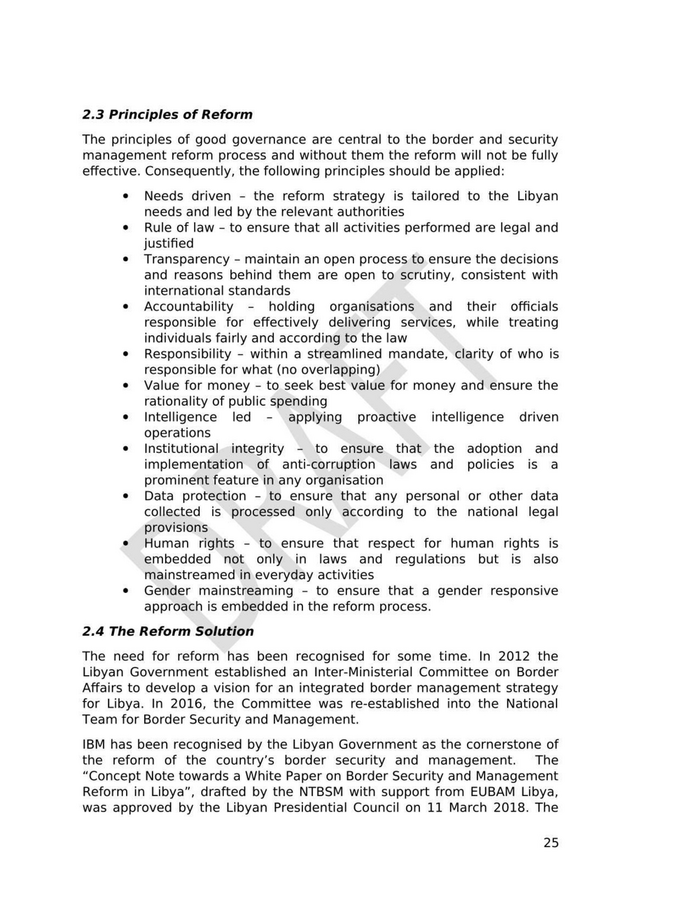
conclusions and recommendations of the Concept Note have set the background and the ongoing development of the present White Paper document. The Concept Note recommended the solution of an overarching coordination function above a new single border agency, a new migration agency, and the existing customs administration. This White Paper has built upon that recommendation. The reform solution is based on the Libyan-tailored IBM concept (outlined at 2.2 above) and recognises the significant need for Libyan migration governance reforms. The proposal is for the creation of a single Border Agency (for border control at air, land, and sea borders), a separate Migration Agency responsible for handling sovereign matters (citizenship, passports, visas, IDs, migration, and asylum). The existing Customs Administration prevents the import and export of illicit and restricted goods and ensures the collection of customs and excise duties. These three agencies will work under the supervision of an Inter-ministerial Border Security and Management Steering Council as shown in Figure 1 below. Inter-ministerial Border Security and Management Steering Council Customs Administration Border Agency Migration Agency The re-organisation of current agencies in the proposed reform is depicted in Figure 2 below. Figure 1 More specifically: Inter-ministerial Border Security - The single border agency would be the only authority | in charge of im plementing an ni iin? LIE? border control at air, land, and sea borders, and shall be established by
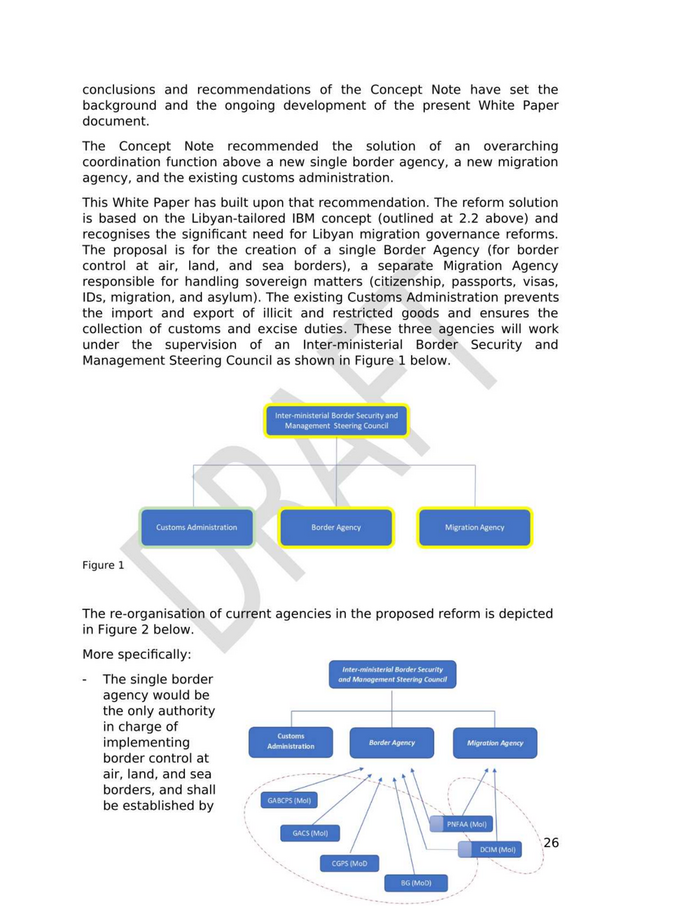
merging the BG, CGPS, GASBCP, GACS, and the Passport Control
Directorate of the current PNFAA. In addition, the border agency would
incorporate the investigative function currently held by DCIM.
- The migration agency would be in charge of handling sovereign matters
(citizenship, passports, visas, IDs, migration, and asylum) and shall be
established by merging the DCIM (minus its investigative function) with
the current PNFAA, without the Passport Control Directorate.
- The Customs Administration would retain its current organisation and
functions and to be the main responsible for the control of goods and
collection of excise and revenue.
In addition to the Inter-ministerial Border Security and Management
Steering Council, this White Paper also recommends establishing an Inter-
ministerial Steering Committee on Migration responsible for developing the
policy and ensuring national coordination in the sphere of migration
governance. The three separate agencies mentioned above (the new
border agency, the new migration agency, and the existing Customs
Administration) will take part, together with other institutions, in
coordination in the area of migration under this Committee. The Border
Security and Management and the Migration Governance framework is
depicted in Figure 3 below.
._. rt mm u u u ur eur
. sinne. er VE un: 6 006: ED 6 a a tn a FE OR
. , . ” " > *
7T } ; \
j us | ’ ;
I \ ‘ (Mor )
| MoAgr Customs ä
; Administration }
. f | Re —__——— I
MD \ Nm Ef wi
| . Tex 1; £
ws = er Inter- ? . J RE
ki 7a 5 , RE y f 1 Inter-
| 5 ministerial u: } RER terial |
1 MFA i Border vi — an eria
> j = , Security and Karren An Ei ä BANN £
: f Y : Akanszement is. 2 Agency 9 Committee ı \--..
: MoH ! wi EN N Pi on EN MoLG
IL ) X Steering IR ı Fa Migration
| e N; Council _. N er
(ul rm oh fi
i Ri
[ | I
| / Migration I
. “ N Agency
\ Other Ne „r
\ — “ S / - I
S ie — nn. ee ee ee t
Figure 3
-
-
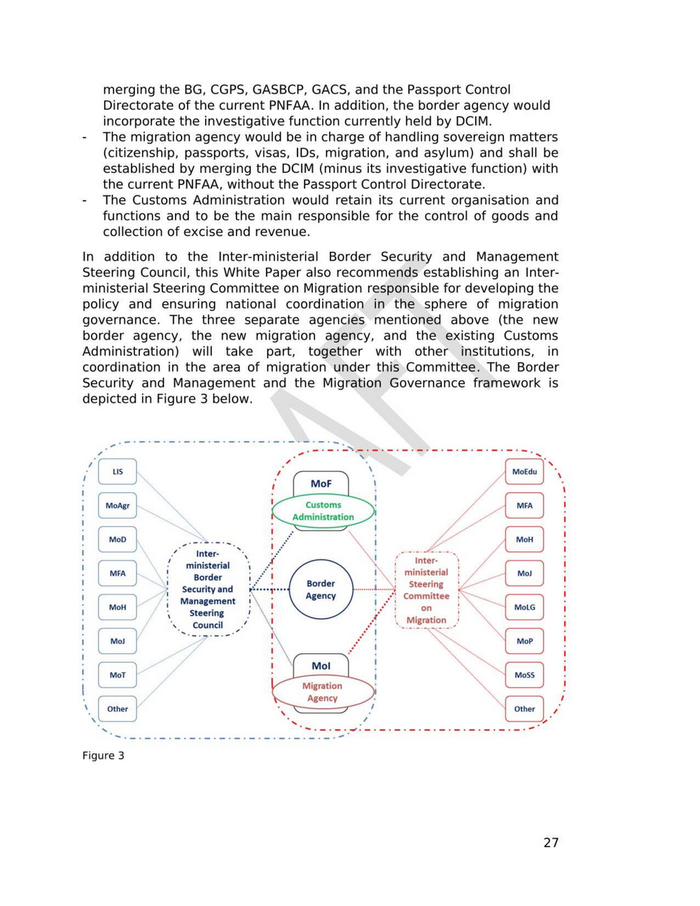
After implementing the institutional reform, relevant Libyan stakeholders should jointly develop: A national overarching border security and management strategy (incorporating IBM and good governance principles), which enumerates the strategic and operational objectives After which, each of the organisations should develop their own business strategy, giving effect to the principles and content of the national overarching border security and management strategy Finally, each of the organisations should develop their own action plans, which describe the concrete actions that have to be taken to reach the objectives of their own business strategy and contribute to the achievement of the national overarching border security and management strategy. National Strategy PET TEE ECHTE ft "RuRlMUELE Figure 4 These documents ensure a unified approach to border security and management among all stakeholders. They will identify priorities and help to obtain the political and administrative support for their implementation. Furthermore, the documents can be used to support the request for financial and technical assistance from the international community. The border agency should take the lead in this process, as a national coordinator and secretariat to the Inter-ministerial Border Security and Management Steering Council, supported by the migration agency and Customs Administration, who would collectively form the core team for this process. 28
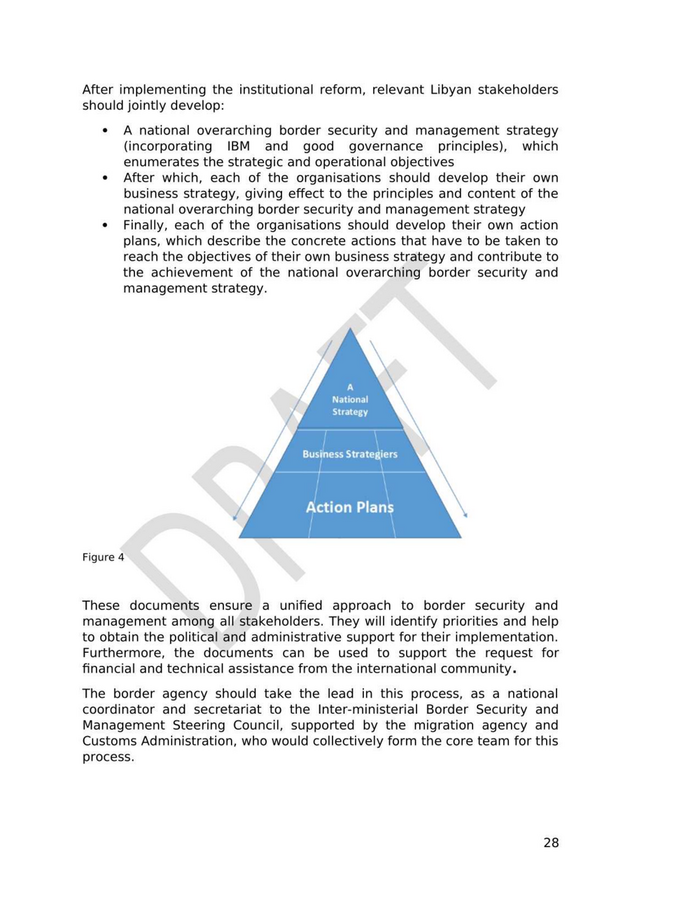
3. INSTITUTIONAL FRAMEWORK The proposed reform solution foresees significant change to the institutional framework for border security and management, including migration governance. This will require legislative amendment, or the creation of new laws. The details of these new entities (Steering Council, Steering Committee, and agencies) are outlined below. 3.1 Inter-ministerial Border Security and Management Steering Council The Inter-ministerial Border Security and Management Steering Council is the decision-making body at the strategic level on border security and management issues in Libya. It should consist of representatives from all institutions who have a role in border security and management in the country. The main tasks of the Steering Council are to ensure political commitment to the overarching national border security and management strategy and to oversee its implementation. Its members therefore need to be of a sufficiently senior level, such as heads of agencies, under- secretaries of state, or deputy ministers. The responsibilities of the Inter-ministerial Border Security and Management Steering Council include: «e Identification of priorities in the area of border security and management (including IBM) cooperation «e Securing sufficient budgetary means, including from the national budget or through external funding «e Adoption of relevant official documents in the field of border security and management or the initiation of legal procedures to allow those documents to be adopted e Monitoring and guidance for the drafting and implementation of the national overarching border security and management strategy, and each of the three organisations’ business strategies and action plans, with regular updating of the documents in line with national priorities « Strategic coordination with neighbouring countries and other high- level coordination bodies in the region e Coordination and subsequent synchronisation of the work of all bodies of the state administration involved in border security and management e Supervision of the work of the operational agencies (border, migration, and customs) «e Provision of guidance to all bodies of the state administration and regional and local bodies in matters related to border security and management 29
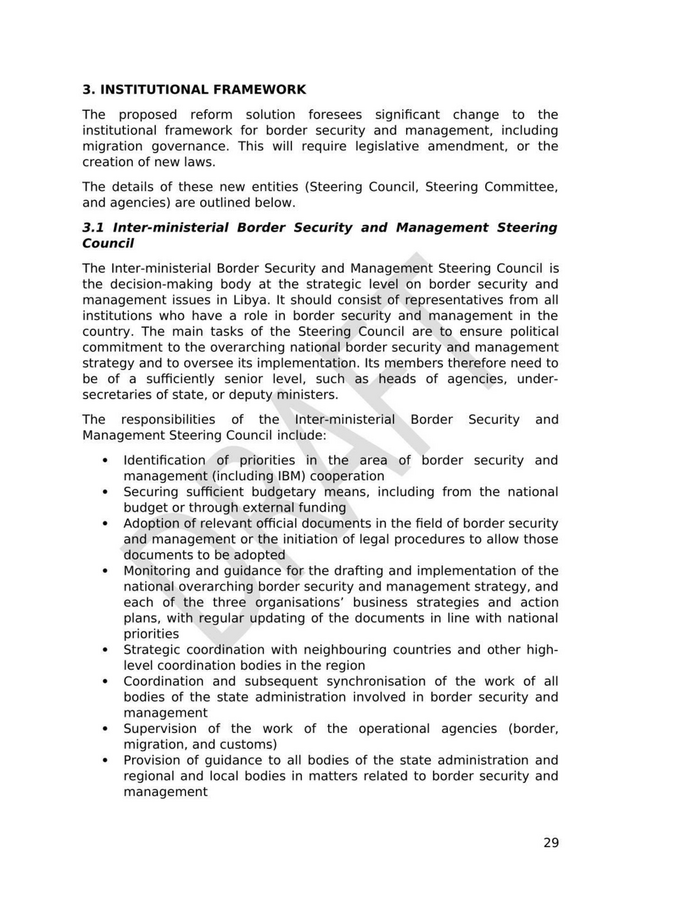
e Mediating and providing suggestions to resolve issues of contention between relevant bodies 3.1.1 Secretariat of the Steering Council Given the nature and number of its tasks, the Inter-ministerial Border Security and Management Steering Council should be supported by a secretariat. This will be a key body for two reasons. Firstly, its expertise will be utilised to inform and advise the Steering Council as it determines issues, reaches decisions, and sets policy. Secondly, it will give effect to the political and policy decisions that are ultimately made by Steering Council. It is suggested that the secretariat be primarily resourced by the border agency, with support from the migration agency and Customs Administration. These three organisations would constitute the core team for the secretariat, ensuring that the Steering Council benefits from relevant expertise and support. The inclusion of the three main organisations will help to overcome and resolve problems of cooperation, which will be a responsibility of the secretariat. Likewise, it should aim to identify areas where increased cooperation would be beneficial and where other joint interests exist. The secretariat will be responsible for the organisation of meetings and for administrative work. It should also be responsible for the preparation and dissemination of relevant documents. In the execution of its functions, and when needed, the secretariat may decide to establish working groups or invite experts on specific topics. 3.1.2 National Coordinator on Border Security and Management The secretariat should be led by a national coordinator on border security and management. As the head of the secretariat, the national coordinator should be provided with the necessary political, administrative, and financial support and powers. In executing the role, she or he would facilitate the border security and management process and include other ministries, institutions, and agencies upon need. The national coordinator will be responsible for communicating the decisions and policies of the Steering Council to the three main organisations. Support and advice may be provided to the organisations to ensure that those decisions and policies are implemented. When relevant, she or he should involve other state bodies as necessary. The national coordinator should submit the results of the Secretariat’s and her or his own work with regular reports to the Steering Council. 3.1.3 Tasks In addition to the responsibilities outlined above, the tasks of the Secretariat, led by the national coordinator, shall include: 30
